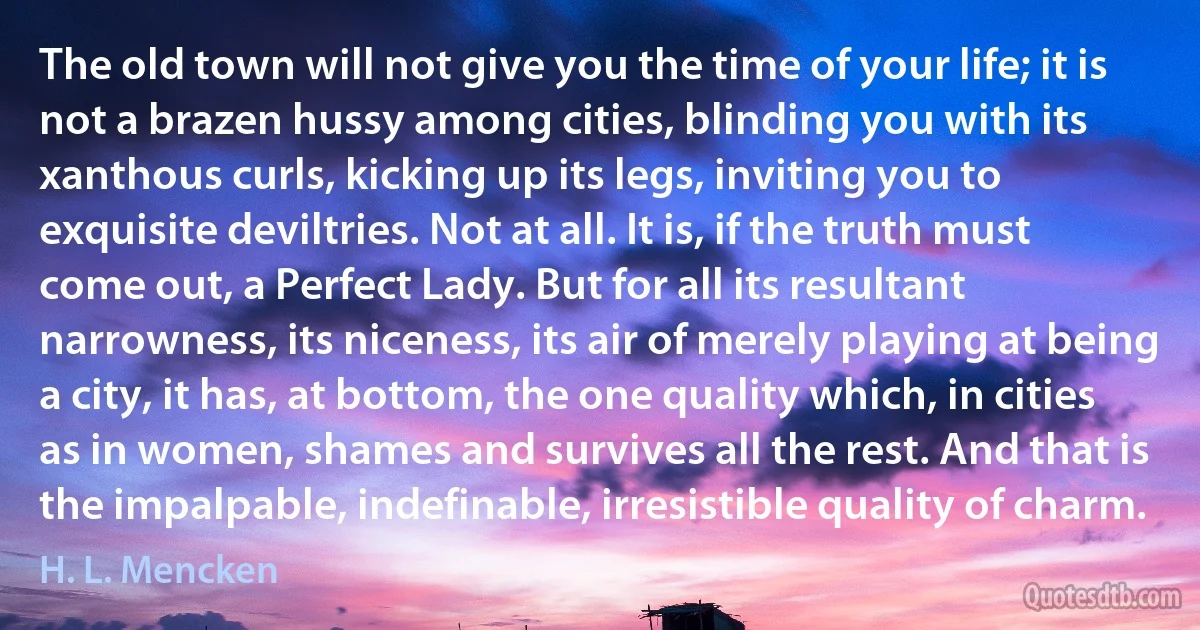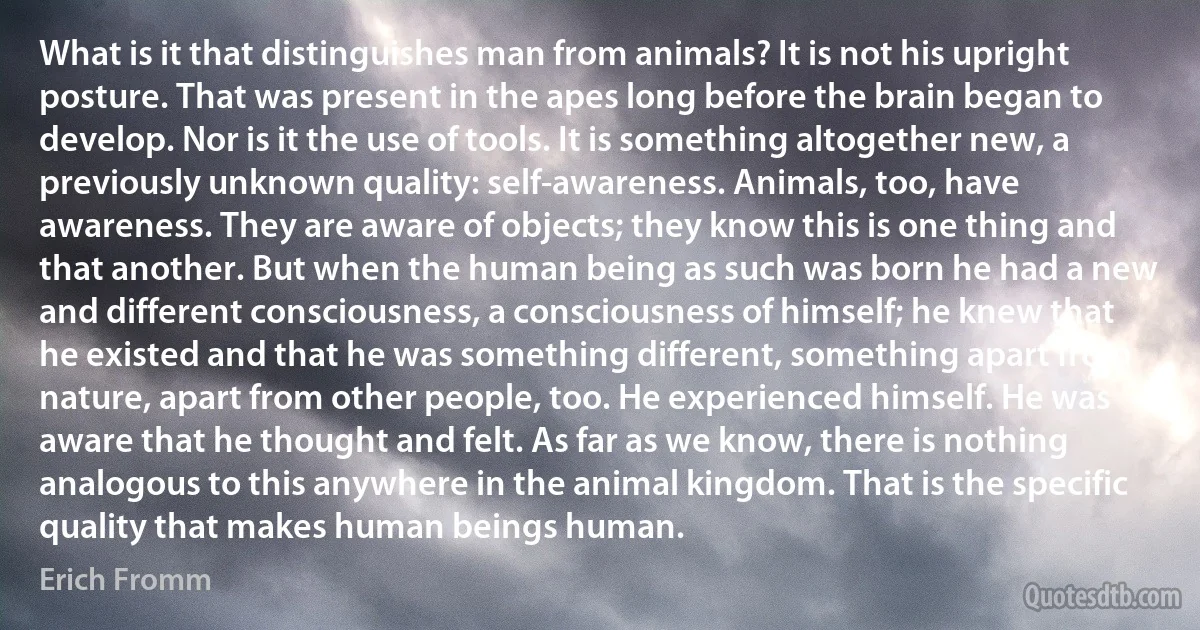Quality Quotes - page 93
It seems to me that, for the nation as for the individual, what is most important is to insist on the vital need of combining certain sets of qualities, which separately are common enough, and, alas, useless enough. Practical efficiency is common, and lofty idealism not uncommon; it is the combination which is necessary, and the combination is rare. Love of peace is common among weak, short-sighted, timid, and lazy persons; and on the other hand courage is found among many men of evil temper and bad character. Neither quality shall by itself avail. Justice among the nations of mankind, and the uplifting of humanity, can be brought about only by those strong and daring men who with wisdom love peace, but who love righteousness more than peace.

Theodore Roosevelt
The love and commitment between two people of the same sex can be as strong as that between husband and wife... There is more moral quality in a relationship between two people devoted to each other for decades than in many a short-lived marriage. Still, however deeply affectionate or long lasting it may be, the relationship between two people of the same sex cannot be a marriage because a marriage, by definition, is between a man and a woman... Let's celebrate all strong relationships, whether they are between a man and a woman or between people of the same sex but let's be careful about describing every lasting sexual bond as a 'marriage'."

Tony Abbott
He supported himself by grinding lenses, which was no lowly menial occupation, as it is often presented to have been in romanticizing versions of the philosopher's life, but was rather a craft that drew extensively from Spinoza's serious interest in the science of optics. The quality of his wares was highly valued by other scientists of his day. The important Dutch astronomer Christiaan Huygens, who discovered Saturn's rings as well as one of its four moons, preferred Spinoza's lenses to all others. "The [lenses] that the Jew of Voorburg has in his microscopes have an admirable polish," Huygens wrote to his brother in 1667. The one part of the romantic lens-grinding legend that is sadly true is that the dust from the optical polishing was unhealthy for Spinoza, whose mother and brother had both died young from tuberculosis. He himself succumbed to the disease at the age of forty-four.

Baruch Spinoza
...If we had the time we should now go on to present the ingenious theory of organism with which Spinoza focused the general ontological scheme specifically on the biological sphere, where mentality is ordinarily seen to be conjoined to physical fact, and particularly on the case of man. It must be enough to say that Spinoza makes it beautifully intelligible from his general premises that the quality and power of a mind are proportionate to the complexity of the body to which it corresponds, so that the perfection of the human body as a piece of physical organization is a direct yardstick for the perfection of the human mind which, as it were, conformally (or: isomorphously) duplicates the body's physical performance on the plane of thought.

Baruch Spinoza
Lightning hits!
Quality! Virtue! Dharma! That is what the Sophists were teaching! Not ethical relativism. Not pristine "virtue." But aretê. Excellence. Dharma! Before the Church of Reason. Before substance. Before form. Before mind and matter. Before dialectic itself. Quality had been absolute. Those first teachers of the Western world were teaching Quality, and the medium they had chosen was that of rhetoric.

Robert M. Pirsig
I feel strongly that all children everywhere should be afforded the opportunity of a quality education, therefore I'm proud to announce Clara Lionel Foundation's partnership with education advocacy leaders like the Global Partnership for Education and Global Citizen. Working together, I know we can amplify our efforts and ensure that millions of children gain access to education globally.

Rihanna
The art of leadership is in the ability to make people want to work for you, while they are really under no obligation to do so. Leaders are people, who raise the standards by which they judge themselves and by which they are willing to be judged. The goal chosen, the objective selected, the requirements imposed, are not mainly for their followers alone.
They develop with consumate energy and devotion, their own skill and knowledge in order to reach the standard they themselves have set.
This whole-hearted acceptance of the demands imposed by even higher standards is the basis of all human progress. A love of higher quality, we must remember, is essential in a leader.

Haile Selassie
All free governments, whatever their name, are in reality governments by public opinion, and it is on the quality of this public opinion that their prosperity depends. It is, therefore, their first duty to purify the element from which they draw the breath of life. With the growth of democracy grows also the fear, if not the danger, that this atmosphere may be corrupted with poisonous exhalations from lower and more malarious levels, and the question of sanitation becomes more instant and pressing. Democracy in its best sense is merely the letting in of light and air.

James Russell Lowell
Love is something absolutely unselfish, that which has no thought beyond the glorification and adoration of the object upon which our affections are bestowed. It is a quality which bows down and worships and asks nothing in return. Merely to love is the sole request that true love has to ask. It is said of a Hindu saint (Mirabai) that when she was married, she said to her husband, the king, that she was already married.
To whom?" asked the king.
To God," was the reply.

Meera Bai
All relations are either qualitative or quantitative. Qualitative relations can be considered by themselves without regard to quantity. The algebra of such enquiries may be called logical algebra, of which a fine example is given by Boole.
Quantitative relations may also be considered by themselves without regard to quality. They belong to arithmetic, and the corresponding algebra is the common or arithmetical algebra.
In all other algebras both relations must be combined, and the algebra must conform to the character of the relations.

Benjamin Peirce
My politics have not changed. I am an old school liberal... when we're talking about the race issue, they changed, not me... We should be moving towards a colorblind society where we don't see race. That is the old way to look at it. I think that is still a good way to look at. That how we win, when it doesn't matter what your race is--the quality of your character, not the color of your skin. That's not wokism. Wokism we have to see it everywhere all the time.

Bill Maher
The pleasant surprise that awaits the visitor to Calcutta is this: it is poor and crowded and dirty, in ways which are hard to exaggerate, but it is anything but abject. Its people are neither inert nor cringing. They work and they struggle, and as a general rule (especially as compared with ostensibly richer cities such as Bombay) they do not beg. This is the city of Tagore, of Ray and Bose and Mrinal Sen, and of a great flowering of culture and nationalism. There are films, theaters, university departments and magazines, all of a high quality. The photographs of Raghubir Singh are a testament to the vitality of the people, as well as to the beauty and variety of the architecture. Secular-leftist politics predominate, with a very strong internationalist temper: hardly unwelcome in a region so poisoned by brute religion. When I paid my own visit to the city some years ago, I immediately felt rather cheated by the anti-Calcutta propaganda put out by the Muggeridges of the world.

Christopher Hitchens
He had a reservoir of learning, from which he drew gracefully and effortlessly. But the most marked quality of his judicial and non-judicial writing was not the ability to borrow an apt quotation or to find an idea well expressed by one who had written before him; it was the ability to think brilliantly in original and bold fashion and to express his thoughts in forceful and eloquent English of a style inimitably his own. His writing was pithy and pungent; yet he never sacrificed clarity of thought for a well-turned phrase. He was a master of the paradox; he had a great love of alliteration and his antithetical statements were gems. Yet his wit never descended to the frivolous; it always added a barb to the telling point. His wit was especially telling when turned upon himself or his Court.

Robert H. Jackson
I feel that what is wrong with scores of modern novels which show literary quality, but which are repellent and depressing to the spirit is not that the writers have rejected a morality, but that they have one which is unexamined, trivial, and lopsided. They have a base concept of life; they bring immense gusto to their portrayals of what is perverse, shabby, and sordid, but they have no clear notion of what is Evil; the idea of Good is unattractive to them, and when they have to deal with it, they do so in terms of the sentimental or the merely pathetic. Briefly, some of them write very well, but they write from base minds that have been unimproved by thought or instruction. They feel, but they do not think. And the readers to whom they appeal are the products of our modern universal literacy, whose feeling is confused and muddled by just such reading, and who have been deluded that their mental processes are indeed a kind of thought.

Robertson Davies
Rembrandt was on a continuous journey of discovery; not on a production line of consistent art objects for the market-place, as the scholars hope to recreate him. His wide ranging methods and interests produced very wide ranging quality. He did not tidy away his less successful works, nor should the scholars do so. He has left us the fullest record of his explorations of any artist and naturally his work includes many comparative failures. But astonishingly, even some of his greatest drawings have been mis-attributed to minor students.

Rembrandt
Artists shouldn't be made famous. You know... they're just ... as important as... um doctors, and priests ... or maybe not as important sometimes, and yet they have this huge aura of almost god-like quality about them, just because their craft makes a lot of money. And at the same time it is a forced importance - you know, football stars and theatre stars - It is man-made so the press can feed off it.

Kate Bush
"Individualism” in the United States refers to privatized ownership, consumption and recreation. You are individualist in that you are expected to get what you can for yourself and not be too troubled by the problems faced by others. This attitude, considered inhuman in some societies, is labeled approvingly as "ambition” in our own and is treated as a quality of great social value.

Michael Parenti
The quality of his play was directly indicative of his values. He gave all he had every game. He was kind and helpful to all of us younger players. He had a desire to be appreciated and drove himself to higher levels of performance than others. He recognized the need to excel in all phases of the game, and he encouraged everyone to do the same. Some others could do what he could, but nobody matched his flair. I loved watching him play because he loved playing.

Roberto Clemente



